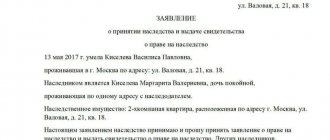Who can claim the inheritance
You can claim your rights to the deceased's property in several cases.
You have the right to an obligatory share in the inheritance
This is a priority reason for receiving an inheritance. Persons in this category participate in the division of property, even if the deceased wanted to dispose of it differently.
Among those who have the right of the Civil Code of the Russian Federation, Article 1149. The right to an obligatory share in the inheritance for an obligatory share in the inheritance:
- minor or disabled children of the deceased;
- disabled spouse and parents;
- disabled dependents of the deceased.
Disabled people, pensioners, and pre-retirees are recognized as disabled - men over 60 years of age and women over 55.
Persons in this category must receive a share of at least half of what they would have been entitled to upon inheritance by law (more on this below). Even if they are mentioned in the will, but their part according to this document is less than the amount determined by law, it will be recalculated to the required level.
However, the opposite is also possible. The share may be reduced or denied if the inheritance includes housing in which another heir permanently resides, or something that he uses to earn money.
If persons from this category receive a share in the inheritance fund (more on that below), the obligatory part is not allocated to them.
Your name is in the will
During his lifetime, a person can write a will of the Civil Code of the Russian Federation, Article 1118. General provisions and leave property to whomever he wishes - and not only what has already been acquired, but also what is only planned to be purchased. Family ties are not important here, what matters is the will of the testator. He can choose one or more heirs and divide the property among them in equal or different shares at his discretion.
The will is drawn up in the presence of a notary. It is important that the testator is considered legally competent at this moment. If there are reasons to believe that he was not capable of thinking soberly, then his orders can easily be challenged in court.
The contents of the will are revealed only after the death of the testator.
You have entered into an inheritance agreement with the deceased
Unlike a will, it is a public document. It sets out the conditions that the heir must fulfill in order to receive the property of the deceased. For example, this is how you can transfer an apartment to a person who will carry you a glass of water in old age. If he doesn’t, he won’t get anything.
The inheritance agreement is signed by a notary by all parties. It takes precedence over the will.
If the testator changes his mind about giving his property in exchange for certain actions, he must compensate the other party for losses associated with the fulfillment of the terms of the contract.
Keep in mind that the owner of the property can freely dispose of it even after concluding an inheritance agreement. For example, selling an apartment.
You are the heir at law
If the deceased did not draw up any wills or inheritance agreements, his property will be divided in equal shares by the Civil Code of the Russian Federation, Article 1141. General provisions between first-degree heirs - children, spouse and parents. When there are no such people, then the second one is brothers, sisters, grandfathers, grandmothers, nephews. If there are no such people, then the third one is the brothers and sisters of grandparents.
Usually three queues are enough, but in total there are eight of them in the Civil Code of the Civil Code of the Russian Federation (part three).
You are included in the charter of the inheritance fund
The inheritance fund is a new form of institution for Russia. The owner of the assets can order such an organization to be founded after his death - this cannot be done during his lifetime. The fund will earn money from the assets of the deceased and pay out profits to those designated by the testator. But the heirs cannot remove the property from circulation.
Registration of inheritance after death
After the death of a citizen, the procedure for processing documents can be simple or complex.
An example of a simple inheritance registration.
Mother died.
Her only heir is her daughter. The apartment is privatized, the documents are in order. The apartment is located in the same city where the daughter lives. My daughter didn’t change her last name, her passport is fine. After the funeral, 2 months later, the daughter collected the necessary additional certificates and began registering the inheritance with a notary. In this example, of course, the daughter can handle the inheritance process herself after the death of her mother. This is not a difficult matter. It is only important that you have time to collect documents and be present in government organizations.
An example of complex inheritance registration.
Mother died. She was married four times. The documents have not been preserved. The apartment in which the mother lived before her death has begun to be privatized and the paperwork has not been completed. The ex-husband claims a share of the inheritance. In addition, the mother had a disabled nephew, whom she supported with her own money and took care of him in every possible way. In addition, during her life, her mother often recalled the unregistered farm in the Novgorod region after her grandmother. And one more thing - the bank filed for a refund of the loan funds.
This is a difficult matter. Not every specialist will be able to understand it. If all the heirs who are entitled to shares in the inheritance can come to an amicable agreement, good. What if everyone “pulls the blanket in their own direction”?
It is important for lawyers to work in the interests of their client. If the customer is a daughter, then the maximum share of the inheritance should go to her. If the customer is a disabled nephew, then the lawyer’s actions are strictly opposite to what a lawyer would do to protect his daughter’s rights. What if your daughter was doing expensive renovations in her apartment? What if the loan was taken out in order to use it for an operation for his mother, and his disabled nephew was supported by his mother’s money, which was given to her by the same daughter? There are many legal positions here that will be different under different circumstances of the case. And citizens themselves are not able to understand such inheritance matters or such complex situations.
How to register an inheritance
In any case, you need to go to the notary at the place of residence of the deceased and submit an application for acceptance of the inheritance. Using a unified notary system, a specialist will check whether the deceased left a will and whether there is an inheritance agreement.
As a result, you will find out whether you can qualify for the property or not. If there is a will, you will be given the contacts of a notary, with the help of which you will assume your rights. You should be aware of the inheritance agreement by default.
Olga Shirokova
Lawyer of the European Legal Service.
The application can be submitted in person, with another person, or by mail. In the last two cases, the heir's signature must be certified by a notary.
After the application, the notary will open the inheritance case. If someone gets ahead of you, your documents will be added to an already open case. You can check in advance whether someone has addressed your question on the website of the Federal Notary Chamber.
There is another option: actually accept the inheritance. In this case, the notary must submit an application to issue a certificate of inheritance. According to Olga Shirokova, it is considered that the heir has accepted the inheritance if it can be confirmed that he manages and uses the property received. For example, you can move into the testator’s apartment, make repairs there, and pay his debts.
If someone shows up with a priority right of inheritance, he can challenge it in court.
How to find out about a will
Usually the testator does not hide the fact of drawing up a will, since only the contents of the document are considered secret. The compiler has the right to provide potential heirs with a copy of the orders regarding his own property drawn up at the notary.
The lack of information from the heirs about the execution of the will, and especially its contents, does not lead to a violation of their rights. The fact is that a notary who opens an inheritance case in accordance with established rules is obliged to verify the existence of a will within 24 hours. This is not difficult to do, since any such documents are entered into a federal database maintained by a notary.
If a will is drawn up, the notary carefully examines its contents, after which he notifies all the people mentioned in it. If their contacts are unknown to him, it is permissible to inform interested parties through an announcement in the media.
This does not mean that the potential heir should wait to hear from the notary. The easiest way to obtain the information he is interested in is to contact a notary office, which should handle the inheritance case. The notary is obliged to provide the requested information in the manner prescribed by law.
How long does it take to accept an inheritance?
The inheritance must be accepted by the Civil Code of the Russian Federation, Article 1154. The period for accepting an inheritance is within six months from the date of the person’s death or the day on which he was declared dead. Those who can receive the property of the deceased only if the heirs of the previous orders do not accept it have three months after the expiration of six months.
If the heirs of the previous orders renounce their rights, the next applicants have 6 months starting from that day.
The deadline for entering into an inheritance can be renewed, but this requires valid reasons - for example, you were seriously ill or were abroad and did not know about the death of the testator.
Who cannot receive an inheritance
The legislation, and specifically Article 1117 of the Civil Code of the Russian Federation, contains the term “unworthy heirs”. It denotes persons who have committed unlawful acts against other heirs or the testator himself. A mandatory additional requirement is confirmation of the fact of the offense in the form of a court decision.
The following persons are recognized as dishonest heirs:
- parents who are officially deprived of parental rights and therefore cannot inherit property after the death of their children;
- heirs who, by force of law, were obliged to support the testator, but avoided doing so;
- heirs who tried to increase their own share of the inheritance or created obstacles in front of other heirs.
The order of two events is important for assigning an heir the status of an unscrupulous one—the adoption of an appropriate decision and the drawing up of a will. Each such situation is considered individually, and only a competent lawyer who specializes in inheritance law can give it a legal assessment.
How much will it cost to receive an inheritance?
For a certificate of the right to inheritance, you will have to pay the state duty of the Tax Code of the Russian Federation, Article 333.24. Amounts of state fees for performing notarial acts. For children, spouse, parents, brothers and sisters of the deceased, it will be 0.3% of the value of the property received - but not more than 100 thousand rubles. The rest will have to pay 0.6% - but not more than 1 million rubles.
The value of property is determined by specialized government agencies or specialized organizations with a license.
State duty may not be paid:
- Heroes of the Soviet Union and the Russian Federation, full holders of the Order of Glory, participants and disabled people of the Second World War.
- Citizens receiving housing in which they lived together with the deceased.
- Those who inherit bank deposits, insurance, royalties.
- Heirs of persons who died while performing civic duty or became victims of political repression.
Registration of inheritance if there is nothing to inherit
In some cases, unregistered objects can be inherited
An unregistered dacha, unprivatized apartments, unknown property, etc. are reasons to contact a legal organization to prove the real inheritance. Of course, it is not possible to register property in all cases. But, if, after careful work, evidence is found that proves the citizen’s intention to register real estate as a property during his lifetime, one can hope for the success of the case.
What else do you need to know
The heirs acquire not only the property, but also the debts of the deceased. They are divided in proportion to the shares received. But this does not apply to all non-payments.
Olga Shirokova
Lawyer of the European Legal Service.
Some of them are subject to a strict non-inheritance rule. These are alimony payments, compensation for damage caused to the health and property of other people, loans from individuals not confirmed by a receipt, moral compensation. The heirs have nothing to do with such debts and are not obliged to pay them.
If the deceased is mired in debt and bequeathed it to you, sometimes it is more profitable to refuse the inheritance. Calculate which will be better. You can issue a refusal within six months. It cannot be cancelled. It is also impossible to refuse part of the inheritance - either everything or nothing.
The procedure for entering into inheritance in Russia
Russian legislation strictly relates to the transfer of rights to property and rights, therefore there are rules for identifying unworthy heirs. This is the name given to persons who influenced the deceased to act in their interests, ignoring the interests of other heirs or their own. This category may include relatives who did not provide care for the deceased or did not help in difficult times.
In the Russian Federation there is an effective procedure for registering an inheritance through a notary, which includes several points:
- Relatives are required to collect and submit documents. Draw up and submit a notarized application, bring a death certificate (copy or original), a document indicating the address of the deceased before his death.
- The case of acceptance is opened and character is established.
- A consultation is held with a notary, who will individually evaluate the case and determine what additional documents and manipulations should be prepared so as not to disrupt the procedure.
- Complete and pay the state fee to obtain a certificate.
- Document the fact that the owner of the inherited property has changed.
- Perform the actual transfer of rights to the heir.
- The notary issues a special certificate.
When a disposition of property has not been made, one must proceed within the prescribed legal provisions. Then factors such as the degree of relationship and the legality of inheritance are taken into account.
Inheritance contract
Registration of inheritance can take place not according to a will, but using an inheritance agreement. The will is unknown even to the participants, and the inheritance agreement provides for the knowledge of all interested parties. In addition, information is available about what conditions the heir must adhere to in order to enter into inheritance according to the law. An inheritance agreement is more authoritative than a will, and its terms will be followed first.
The agreement is concluded between the testator and the heir. This document must contain the following information:
- under what conditions the number of heirs is determined, and in what order the transfer of rights to inheritance will take place;
- executor and his terms;
- what obligations do the parties have in relation to property or non-property objects (they should not contradict the law);
- discuss the circumstances, depending on which different consequences may arise.
The inheritance agreement is limited by the provision on the allocation of a mandatory share. After drawing up the agreement, it is studied by the parties and signed. Next, the document is certified by a notary.
Even if one of the parties to the agreement renounces his share, this does not affect the rights of the other parties. The only one who can refuse the agreement is the testator, but the parties must receive notification of changes. In addition, participants can receive compensation for losses they incurred while fulfilling the terms of the contract. After the contract is terminated, the testator can fully dispose of the property, including by selling it.
Inheritance of a common-law husband
As a rule, “civil marriage” in society refers to relationships between a man and a woman that are not registered with authorized bodies. People can have children together, buy real estate, run a joint household, but they cannot be called legal spouses, because their relationship was not registered with the civil registry office . People living in a civil marriage should be called cohabitants .
According to the law, the inheritance cannot be transferred in the first place to the cohabitant, i.e. the common-law husband of the deceased. The only option to undeniably receive property as a result of inheritance is to write and execute a will.
If there is one, the share owned as a result of the death of the cohabitant will go to her common-law husband. But it should be taken into account that if a spouse has minor or disabled children or parents, then they have the full right to inherit on an equal basis with the deceased woman’s cohabitant .
If the common-law spouse died without leaving a testamentary document, then the heirs specified in Art. 1142 of the Civil Code of the Russian Federation, in the order of priority established by law.
Refusal of inheritance
Each heir has the right to refuse the property of the testator.
In order to issue a refusal, you must:
- Contact the notary who opened the case.
- Write a statement of refusal.
- Pay the state fee to certify your will.
The text of the application does not indicate the reason for the refusal.
The law allows for refusal of inheritance in favor of another person from among close relatives.
The spouse has a share
If there is one, then in addition to the inheritance itself, the spouse can claim rights to half of everything acquired during the marriage. For example, if housing was purchased using joint financial assets, then both spouses have completely similar rights to it. The fact that official documents are issued for only one of them will not matter here.
When deciding on the issue of inheritance rights, the notary will first deal with the registration of the marital share and only after that - the allocation of shares for all heirs.
If you follow the law, then the shares of the spouses are equal, therefore exactly half will be given to the property of the surviving husband or wife. What remains after this allocation will be at the disposal of the heirs. Moreover, the spouse will also participate in this process.
To make the process of distribution of shares clear, it is better to illustrate this with an example.
A middle-aged man died. Some time passed after the funeral when the relatives decided to start filling out the paperwork. This is where a dispute arose about who has more rights. Relatives include his wife, teenage son and elderly parents. The object over which the conflict flared up was a three-room Khrushchev house. The couple bought it seven years after the official registration of the marriage. Obviously, half of this housing will go to the wife. The other part will be divided equally between the wife, son and parents.
Types of inheritance
Entering into an inheritance after the death of the testator can take place taking into account several scenarios, depending on what is the prerequisite for receiving it - a will or the law. Each option requires detailed consideration.
Entry into inheritance according to law
According to the law, entry into inheritance after death occurs if the deceased did not create anything. The law prescribes the order of heirs. There are 8 steps. For example, children, husbands/wives, parents, and the state closes the list. A certain order is required - everyone is called to the notary, according to their place in the queue. If there are no main heirs, the second, third, etc. are called. queues.
Entry into inheritance under a will
A will is a document that indicates who the heir is without taking into account the degree of relationship and other circumstances. The document can be closed (when the notary does not know about the contents of the will, and the envelope is transferred sealed in front of witnesses) and open (the notary is familiar with the contents). Please note that a closed will may contain errors and inaccuracies, which sometimes affect the procedure. Although if the inaccuracies are minor, they will not affect the legality of the paper.
The document is usually drawn up by a notary, who checks, certifies and stores it. The specialist will ensure that everything goes correctly, without trying to challenge the document or invalidate it. In addition, the notary is obliged to confirm the legal capacity of the testator and make sure that he understands his actions. This applies to situations where people try to make a will while under the influence of alcohol or drugs.
There must be only one will that is legally binding. When there are several conflicting documents, the one drawn up last will be valid. However, the document can be canceled by making a new will or by writing an official cancellation of previous instructions.
The heirs do not need to be notified of the will. To verify the availability of a document, you should contact a notary office, where a search will be carried out in the register upon request. Then the essence of the will is conveyed to the heir. This information cannot be publicly available, as this violates the secrecy of the will. Registration of inheritance through a notary will make this procedure safer.
What documents will you need
- A document certifying the death of the testator. The most common is a death certificate. In some cases, this may be a court decision declaring a citizen dead or a certificate from the Migration Office (Office for Migration) about the last place of residence of the testator
- Documents confirming rights to inheritance. In the case of a will, your passport is sufficient. But if there are heirs claiming an obligatory share of the inheritance, in addition to passports, they are required to provide evidence of kinship (birth certificate, adoption certificate, marriage certificate)
- Additional documents are required to prove the right to an obligatory part of the inheritance. This could be: a pension certificate, a disability certificate, documents proving residence as a dependent of the testator, etc.
It makes sense to call the notary in advance so that he can tell you what additional documents may be required and prepare them in advance. Otherwise you will have to go to him again. You can also contact a notary on our portal Prav.io.
Limitation periods
This term is used if you have to defend your rights in court.
For inheritance disputes, this period is three years. The countdown begins from the moment a person learns of a violation of his rights.
The deadline for applying to court for an heir is 10 years (Article 196 of the Civil Code of the Russian Federation).
Deadline missed
Missing the deadline allotted for re-registration of the inheritance is regarded by the notary as the person’s reluctance to accept the property. He distributes his share among other legal successors who have approached him.
But in practice, there are cases when a potential heir had good reasons for missing the deadline. In this case, an action algorithm is provided that allows you to protect your rights and restore the lost period.






